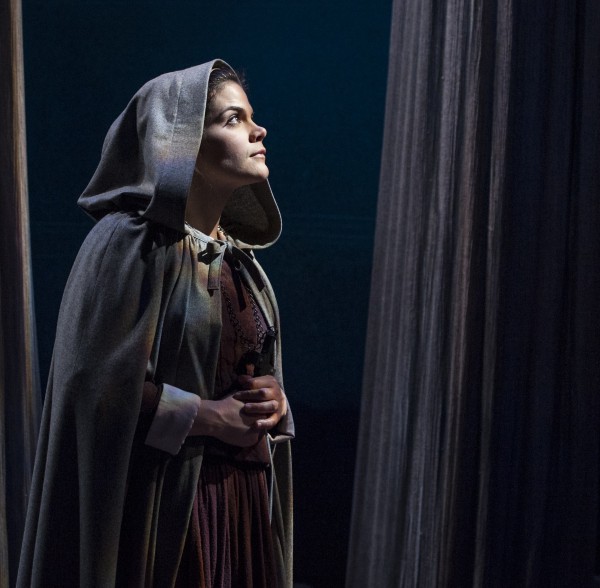Speak of the Devil: That’s What They Do in Abigail/1702, and People Love it

Abigail Williams (Diane Davis), steeped in wickedness, aspires to be an angel.
Abigail/1702 takes a strange story and makes it stranger. On opening night at City Theatre, as will be described shortly, it provoked an unusual reaction from the audience. And you know you are in for a strange evening as soon as you sit down and open the play’s program. To avoid spoilers, it lists a couple of the cast members as follows: John Feltch playing “Reverend Parris and Others,” and Deirdre Madigan playing “Margaret Hale and Others.”
While it is common for an actor to play more than one character, rarely do you find a theater company not even wanting to tip off which characters will show up. But in Abigail/1702, some chilling ones do. They are recalled in flashback, and they reappear in real time and in unreal time, because Abigail (Diane Davis) is haunted by the Ghosts of Evil Past, Evil Present, and Evil Yet to Come.
The play, by Roberto Aguirre-Sacasa—who also has written for Marvel Comics—is about a super-villain rather than a superhero. It is a sequel to Arthur Miller’s The Crucible, which was based on the Salem witch trials of 1692. Abigail Williams in that play was the conniving teenager at the heart of all the trouble. Let’s briefly recount her sins.
The Backstory
In The Crucible, Abigail was a housemaid in Salem. Her first offense was having an affair with the married man of the house, John Proctor. Abigail also was part of a group of local girls who liked to sneak into the woods at night, where they practiced exotic rituals and lascivious dances taught to them by a slave girl from Barbados. Were these rituals meant to conjure up Satan? The Puritans of the region thought so, once they learned of them. Abigail squirmed and denied any devilish intent, until realizing that the best way out was to squeal. Whereupon she started naming names of reputable citizens she claimed to have seen keeping company with the Prince of Darkness.
Thus began the hysteria. Some of it backfired on Abigail when she tried to implicate John Proctor’s wife as a witch, and instead it was John who wound up hanging. But Abigail didn’t stay in Salem to watch him swing. By then she had fled town, carrying a stash of stolen money, along with the blood of 20 innocent people on her hands.
Never to be seen again. Until the sequel.
Why Are They Cheering?
Abigail/1702 picks up her snakelike trail 10 years later, to depict how her treacherous life is playing out. And here is what struck me about the audience’s reaction on opening night. Usually, only in musicals or operas is there applause DURING a play. Certainly not in the midst of a tense psychodrama.
Yet here were people clapping and shouting when the stage would darken briefly after a gripping scene, as they might do after a rousing song and dance or a pitch-perfect aria. Then they capped it with a standing ovation at the end.
Did the audience cheer because Abigail was finally getting what she deserved? Aha. Good question. What does this “Queen of Hell,” as one character calls her, truly deserve? That is the heart of the matter, for it’s the question that Abigail herself cannot escape, and the play hooks you by turning the tables. It gets you rooting for Abigail, one of the arch-villains of American theater.
The Old Back-and-Forth
People cheered partly for the tour-de-force acting of Diane Davis in the title role, as well as for the acting of certain “Others.” But they also cheered for what was being acted out: a morality play. Or more precisely, a moral cliffhanger, in which the black and white of right and wrong don’t blur into some relativistic shade of gray, but rather they—well, no spoilers.
In this sequel—which does not, incidentally, draw from the history of the real Abigail Williams, as The Crucible did, in part—Abigail in 1702 is appalled by her past. Living under an assumed name somewhere outside Boston, she is striving feverishly to exorcise the demons. The grown-up Abigail has consigned her life to solitary chastity while running a one-woman pox house: a place where smallpox patients can hopefully find better care than that afforded by the doctors of the time.

John Brown (Zachary Spicer) has the fever; does Abigail have the cure?
And then along comes a sailor. Another John, this one called John Brown (Zachary Spicer), who has the early symptoms, combined with qualities that one may find appealing in a sailor. Is he handsome? Check. Swashbuckling? Even while he moans. Does he, at some point in his fever, remove his shirt to reveal a veritable treasure of a chest? Naturally. And yes, it looks as if John Brown might survive the pox, and yes he is interested, but is he, is he—is he a good man?

Perhaps the only way to attain to the highest in one’s life is by getting to the bottom of it. John Brown and Abigail debate the issue.
Ahh, another good question. And one that really gets the cliffhanger aspect going, because now we have multiple levels of uncertainty and back-and-forth. There is the back-and-forth mating dance of this duo of the damned, coupled with Abigail’s recurring travels back and forth in time, experienced in her mind but acted out on stage. Each cycle turns up another layer of EVIL, but wait!—beneath it, a layer of something else.
Maybe something good? Sorry. No spoilers. As one audience member commented while we were filing out afterward: “The devil is in the details.”
Closing Credits
It helps greatly that Abigail/1702 mixes humor with the grimness, one benefit of having a playwright who writes comics. Tracy Brigden has done what a fine director does, taking the play in the directions it needs to go. The brothers Kylan and Nels Bjornson alternate in the cast as the young boy Thomas, and they’re all good, no evil. Abigail/1702 plays at varying curtain times, Tuesdays through Sundays, through May 26 at City Theatre, 1300 Bingham St., South Side. Tickets: 412-431-CITY or http://www.citytheatrecompany.org/play/abigail1702/.
Mike Vargo, an experienced, longtime writer based in Pittsburgh, has himself performed on stage but “not very well,” he says. So he sticks to writing about it.
Photos courtesy Abby Kraftowitz and City Theatre
Share on Social Media
Follow Entertainment Central
Latest Stories
Sign up for the EC Newsletter







